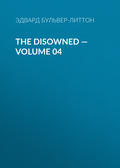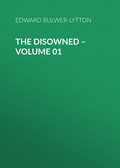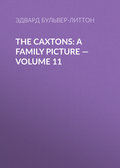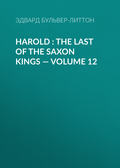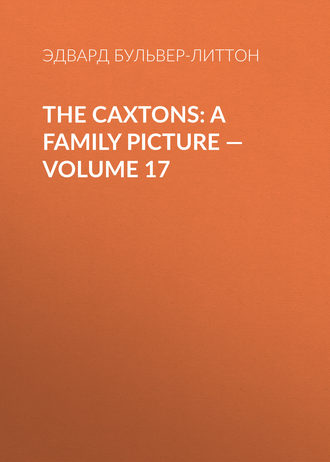
Эдвард Бульвер-Литтон
The Caxtons: A Family Picture — Volume 17
PART XVII
CHAPTER I
The stage-scene has dropped. Settle yourselves, my good audience; chat each with his neighbor. Dear madam in the boxes, take up your opera- glass and look about you. Treat Tom and pretty Sal to some of those fine oranges, O thou happy-looking mother in the two-shilling gallery! Yes, brave 'prentice-boys in the tier above, the cat-call by all means! And you, "most potent, grave, and reverend signiors" in the front row of the pit, practised critics and steady old playgoers, who shake your heads at new actors and playwrights, and, true to the creed of your youth (for the which all honor to you!), firmly believe that we are shorter by the head than those giants our grandfathers,—laugh or scold as you will, while the drop-scene still shuts out the stage. It is just that you should all amuse yourselves in your own way, O spectators! for the interval is long. All the actors have to change their dresses; all the scene-shifters are at work sliding the "sides" of a new world into their grooves; and in high disdain of all unity of time, as of place, you will see in the play-bills that there is a great demand on your belief. You are called upon to suppose that we are older by five years than when you last saw us "fret our hour upon the stage." Five years! the author tells us especially to humor the belief by letting the drop- scene linger longer than usual between the lamps and the stage.
Play up, O ye fiddles and kettle-drums! the time is elapsed. Stop that cat-call, young gentleman; heads down in the pit there! Now the flourish is over, the scene draws up: look before.
A bright, clear, transparent atmosphere,—bright as that of the East, but vigorous and bracing as the air of the North; a broad and fair river, rolling through wide grassy plains; yonder, far in the distance, stretch away vast forests of evergreen, and gentle slopes break the line of the cloudless horizon. See the pastures, Arcadian with sheep in hundreds and thousands,—Thyrsis and Menalcas would have had hard labor to count them, and small time, I fear, for singing songs about Daphne. But, alas! Daphnes are rare; no nymphs with garlands and crooks trip over those pastures.
Turn your eyes to the right, nearer the river; just parted by a low fence from the thirty acres or so that are farmed for amusement or convenience, not for profit,—that comes from the sheep,—you catch a glimpse of a garden. Look not so scornfully at the primitive horticulture: such gardens are rare in the Bush. I doubt if the stately King of the Peak ever more rejoiced in the famous conservatory, through which you may drive in your carriage, than do the sons of the Bush in the herbs and blossoms which taste and breathe of the old fatherland. Go on, and behold the palace of the patriarchs,—it is of wood, I grant you; but the house we build with our own hands is always a palace. Did you ever build one when you were a boy? And the lords of that palace are lords of the land almost as far as you can see, and of those numberless flocks; and, better still, of a health which an antediluvian might have envied, and of nerves so seasoned with horse-breaking, cattle-driving, fighting with wild blacks,—chases from them and after them, for life and for death,—that if any passion vex the breast of those kings of the Bushland, fear at least is erased from the list.
See here and there through the landscape rude huts like the masters': wild spirits and fierce dwell within. But they are tamed into order by plenty and hope; by the hand open but firm, by the eye keen but just.
Now out from those woods, over those green rolling plains, harum-scarum, helter-skelter, long hair flying wild, and all bearded as a Turk or a pard, comes a rider you recognize. The rider dismounts, and another old acquaintance turns from a shepherd, with whom he has been conversing on matters that never plagued Thyrsis and Menalcas,—whose sheep seem to have been innocent of foot-rot and scab,—and accosts the horseman.
Pisistratus.—"My dear Guy, where on earth have you been?"
Guy (producing a book from his pocket, with great triumph).—"There! Dr. Johnson's 'Lives of the Poets.' I could not get the squatter to let me have 'Kenilworth,' though I offered him three sheep for it. Dull old fellow, that Dr. Johnson, I suspect,—so much the better, the book will last all the longer. And here's a Sydney paper, too, only two months old!" (Guy takes a short pipe, or dudeen, from his hat, in the band of which it had been stuck, fills and lights it.)
Pisistratus.—"You must have ridden thirty miles at the least. To think of your turning book-hunter, Guy!"
Guy Bolding (philosophically).—"Ay, one don't know the worth of a thing till one has lost it. No sneers at me, old fellow; you, too, declared that you were bothered out of your life by those books till you found how long the evenings were without them. Then, the first new book we got—an old volume of the 'Spectator!'—such fun!"
Pisistratus.—"Very true. The brown cow has calved in your absence. Do you know, Guy, I think we shall have no scab in the fold this year. If so, there will be a rare sum to lay by! Things look up with us now, Guy."
Guy Bolding.—"Yes. Very different from the first two years. You drew a long face then. How wise you were, to insist on our learning experience at another man's station before we hazarded our own capital! But, by Jove! those sheep at first were enough to plague a man out his wits. What with the wild dogs, just as the sheep had been washed and ready to shear; then that cursed scabby sheep of Joe Timmes's, that we caught rubbing his sides so complacently against our unsuspecting poor ewes. I wonder we did not run away. But Patientia fit,—what is that line in Horace? Never mind now. 'It is a long lane that has no turning' does just as well as anything in Horace, and Virgil to boot. I say, has not Vivian been here?"
Pisistratus.—"No; but he will be sure to come to-day."
Guy Bolding.—"He has much the best berth of it. Horse-breeding and cattle-feeding: galloping after those wild devils; lost in a forest of horns; beasts lowing, scampering, goring, tearing off like mad buffaloes; horses galloping up hill, down hill, over rocks, stones, and timber; whips cracking, men shouting, your neck all but broken; a great bull making at you full rush. Such fun! Sheep are dull things to look at after a bull-hunt and a cattle-feast."
Pisistratus.—"Every man to his taste in the Bush. One may make one's money more easily and safely, with more adventure and sport, in the bucolic department; but one makes larger profit and quicker fortune, with good luck and good care, in the pastoral,—and our object, I take it, is to get back to England as soon as we can."
Guy Bolding.—"Humph! I should be content to live and die in the Bush,— nothing like it, if women were not so scarce. To think of the redundant spinster population at home, and not a spinster here to be seen within thirty miles,—save Bet Goggins, indeed, and she has only one eye! But to return to Vivian: why should it be our object, more than his, to get back to England as soon as we can?"
Pisistratus.—"Not more, certainly. But you saw that an excitement more stirring than that we find in the sheep had become necessary to him. You know he was growing dull and dejected; the cattle station was to be sold a bargain. And then the Durham bulls and the Yorkshire horses which Mr. Trevanion sent you and me out as presents, were so tempting, I thought we might fairly add one speculation to another; and since one of us must superintend the bucolics, and two of us were required for the pastorals, I think Vivian was the best of us three to entrust with the first,—and certainly it has succeeded as yet."
Guy.—"Why, yes, Vivian is quite in his element,—always in action, and always in command. Let him be first in everything, and there is not a finer fellow, nor a better tempered,—present company excepted. Hark! the dogs, the crack of the whip; there he is. And now, I suppose, we may go to dinner."
(Enter Vivian.) His frame has grown more athletic; his eye, more steadfast and less restless, looks you full in the face. His smile is more open, but there is a melancholy in his expression almost approaching to gloom. His dress is the same as that of Pisistratus and Guy,—white vest and trousers; loose neckcloth, rather gay in color; broad cabbage-leaf hat; his mustache and beard are trimmed with more care than ours. He has a large whip in his hand, and a gun slung across his shoulders. Greetings are exchanged; mutual inquiries as to cattle and sheep, and the last horses despatched to the Indian market. Guy shows the "Lives of the Poets," Vivian asks if it is possible to get the Life of Clive, or Napoleon, or a copy of Plutarch. Guy shakes his head; says if a Robinson Crusoe will do as well, he has seen one in a very tattered state, but in too great request to be had a bargain.
The party turn into the hut. Miserable animals are bachelors in all countries, but most miserable in Bushland. A man does not know what a helpmate of the soft sex is in the Old World, where women seem a matter of course. But in the Bush a wife is literally bone of your bone, flesh of your flesh,—your better half, your ministering angel, your Eve of the Eden; in short, all that poets have sung, or young orators say at public dinners when called upon to give the toast of "The Ladies." Alas! we are three bachelors, but we are better off than bachelors often are in the Bush; for the wife of the shepherd I took from Cumberland does me and Bolding the honor to live in our but and make things tidy and comfortable. She has had a couple of children since we have been in the Bush; a wing has been added to the but for that increase of family. The children, I dare say, one might have thought a sad nuisance in England; but I declare that, surrounded as one is by great bearded men from sunrise to sunset, there is something humanizing, musical, and Christian-like in the very squall of the baby. There it goes, bless it! As for my other companions from Cumberland, Miles Square, the most aspiring of all, has long left me, and is superintendent to a great sheep-owner some two hundred miles off. The Will-o'-the-Wisp is consigned to the cattle station, where he is Vivian's head man, finding time now and then to indulge his old poaching propensities at the expense of parrots, black cockatoos, pigeons, and kangaroos. The shepherd remains with us, and does not seem, honest fellow, to care to better himself; he has a feeling of clanship which keeps down the ambition common in Australia. And his wife—such a treasure! I assure you, the sight of her smooth, smiling woman's face when we return home at nightfall, and the very flow of her gown as she turns the "dampers"1 in the ashes and fills the teapot, have in them something holy and angelical. How lucky our Cumberland swain is not jealous! Not that there is any cause, enviable dog though he be; but where Desdemonas are so scarce, if you could but guess how green-eyed their Othellos generally are! Excellent husbands, it is true,—none better; but you had better think twice before you attempt to play the Cassio in Bushland! There, however, she is, dear creature!—rattling among knives and forks, smoothing the table-cloth, setting on the salt beef, and that rare luxury of pickles (the last pot in our store), and the produce of our garden and poultry-yard, which few Bushmen can boast of, and the dampers, and a pot of tea to each banqueter,—no wine, beer, nor spirits; those are only for shearing-time. We have just said grace (a fashion retained from the holy mother-country), when, bless my soul! what a clatter without, what a tramping of feet, what a barking of dogs! Some guests have arrived. They are always welcome in Bushland! Perhaps a cattle-buyer in search of Vivian; perhaps that cursed squatter whose sheep are always migrating to ours. Never mind,—a hearty welcome to all, friend or foe. The door opens; one, two, three strangers. More plates and knives; draw your stools: just in time. First eat, then— what news?



